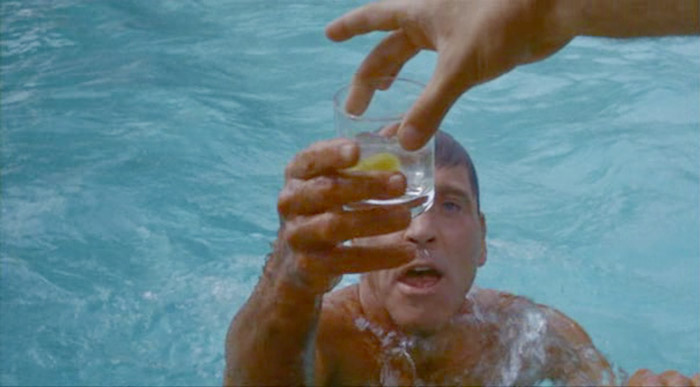The Swimmer opens by tracking Neddy Merrill (Burt Lancaster) in his tight swim trunks as he cuts through the wilderness into his neighbours’ yard and gracefully takes a dive into their pool. Slicing through the water with powerful breaststrokes, Merrill surfaces to receive a glass of gin. A midsummer sun beams, Ned’s neighbours greet him with warmth, and he sips his drink. As the film progresses, however, the sky darkens, the air chills, and Neddy loses strength. The film spans one day of pool-hopping, but allegorically it traces Neddy swimming through his past. What at first seems a glorious adventure reveals itself to be quite the opposite.
The screenplay for The Swimmer is a faithful rendition of John Cheever’s short story of the same name. Known as “the Chekhov of the suburbs,” Cheever wrote about the soporific, sybaritic confines of suburbia with playful humor and extended metaphors. Neddy Merrill is the tragic hero of the film. He’s an entitled, charismatic lothario accustomed to deferential respect and getting his way, be it through money or his name alone. One summer afternoon, Neddy announces that he will swim his way home by hopping into a string of his neighbours’ pools that serve as a river guiding him toward his destination. Cheever writes: “In his mind he saw a string of swimming pools, a quasi-subterranean stream that curved the county, and he knew that he would find friends along the way.” Neddy names the string of pools the Lucinda River after his wife, Lucinda Merrill, and considers himself an explorer as he embarks on his journey home to his two daughters, who he claims are playing tennis.
As Neddy swims through pools and crosses backyards, highways, and gardens, it becomes increasingly clear that he is not the larger-than-life, carefree spirit he thinks he is, but a huge failure. In this way, The Swimmer is stylistically fascinating. It starts off plausible and realistic, then somewhere along the way blurs into surreal waters. The viewer gradually learns not to trust Neddy, who at first seemed so reliable.
Beginning his voyage, Neddy manages to convince a beautiful young girl (Janet Landgard), his daughter’s babysitter, to join him on his mission. A slow-motion sequence shows the two playing like children, laughing and holding hands. When Neddy unintentionally scares her off, it is clear that he is attempting to grasp onto a youth that is no longer there. Later, Neddy reaches a drained pool where a lonely boy sits playing the recorder. He takes the boy’s hand and tells him: “If you make believe hard enough that something is true, then it is true for you.” This seems to be Neddy’s main issue: Self-deception. Not only does Neddy wrongly believe everything to be fine, he also relentlessly holds onto the belief that his wealth makes him a supremely entitled being. As he crosses a highway to reach his final pool, a public one, Neddy tries to enter without paying the necessary fifty cent charge. Forced to pay and use the public shower, he finally enters the overcrowded pool and swims through murky waters, elbowed and shoved. When he steps out at the other side, he is not handed a glass of gin. His eyes sting from chlorine and he is shivering.
The use of water in The Swimmer is reminiscent of scenes from Mike Nichols’ groundbreaking classic The Graduate (1967), which was released one year prior. Benjamin Braddock (Dustin Hoffman) faces the familiar pressures that accompany being a recent college graduate. To escape the stresses of deciding on a career and future life plans, Benjamin’s favourite pastime is to lie on a raft drifting in his pool. It is with the same carefree nonchalance that Neddy dives into pool after pool, ignoring an unpleasant reality.
While many critics believe Lancaster was miscast as Neddy Merrill, the film manages to be an melancholy exploration of time passing and youth fading. It is a memorable, tragic character study of a suburbanite with a distorted sense of grandiosity and a blithe tendency to reject reality.









